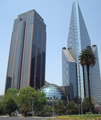The Business and Economics Portal Business is the practice of making one's living or making money by producing or buying and selling products (such as goods and services). It is also "any activity or enterprise entered into for profit." A business entity is not necessarily separate from the owner and the creditors can hold the owner liable for debts the business has acquired. The taxation system for businesses is different from that of the corporates. A business structure does not allow for corporate tax rates. The proprietor is personally taxed on all income from the business. A distinction is made in law and public offices between the term business and a company such as a corporation or cooperative. Colloquially, the terms are used interchangeably. (Full article...) Economics (/ˌɛkəˈnɒmɪks, ˌiːkə-/) is a social science that studies the production, distribution, and consumption of goods and services. Economics focuses on the behaviour and interactions of economic agents and how economies work. Microeconomics analyses what is viewed as basic elements within economies, including individual agents and markets, their interactions, and the outcomes of interactions. Individual agents may include, for example, households, firms, buyers, and sellers. Macroeconomics analyses economies as systems where production, distribution, consumption, savings, and investment expenditure interact, and factors affecting it: factors of production, such as labour, capital, land, and enterprise, inflation, economic growth, and public policies that have impact on these elements. It also seeks to analyse and describe the global economy. (Full article...) Selected articleThe Million Dollar Homepage is a website conceived in 2005 by 21-year-old student Alex Tew from Wiltshire, England, to raise money for his university education. The home page consists of a million pixels arranged in a 1000 × 1000 pixel grid; the image-based links on it were sold for $1 per pixel in 10 × 10 blocks. The purchasers of these pixel blocks provided tiny images to be displayed on them, a Uniform Resource Locator (URL) to which the images were linked, and a slogan to be displayed when hovering a cursor over the link. The aim of the site was to sell all of the pixels in the image, thus generating a million dollars of income for the creator. The Wall Street Journal has commented that the site inspired other websites that sell pixels. Launched on 26 August 2005, the website became an Internet phenomenon. The Alexa ranking of web traffic peaked at around 127; as of 9 May 2009, it is 40,044. On 1 January 2006, the final 1,000 pixels were put up for auction on eBay. The auction closed on 11 January with a winning bid of $38,100 that brought the final tally to $1,037,100 in gross income. During the January 2006 auction, the website was subject to a distributed denial-of-service attack and ransom demand, which left it inaccessible to visitors for a week while its security system was upgraded. The Federal Bureau of Investigation and Wiltshire Constabulary investigated the attack and extortion attempt. Selected image
Selected economyThe economy of New Zealand is a highly developed free-market economy. It is the 52nd-largest national economy in the world when measured by nominal gross domestic product (GDP) and the 62nd-largest in the world when measured by purchasing power parity (PPP). New Zealand has one of the most globalised economies and depends greatly on international trade, mainly with China, Australia, the European Union, the United States, and Japan. New Zealand's 1983 Closer Economic Relations agreement with Australia means that the economy aligns closely with that of Australia. Among OECD nations, New Zealand has a highly efficient and strong social security system; social expenditure stood at roughly 21.5% of GDP. New Zealand's diverse economy is made up of various types of informal and formal organisations, divided between two sectors, public and private. It has a sizeable service sector, accounting for 63% of all GDP activity . As a large island nation New Zealand has abundant natural resources and mineral wealth. Prominent manufacturing industries include aluminium production, food processing, metal fabrication, wood and paper products. Mining, manufacturing, electricity, gas, water, and waste services accounted for 16.5% of GDP . The primary sector continues to dominate New Zealand's exports, despite accounting for only 6.5% of GDP . The information technology sector is growing rapidly. (Full article...) Selected quote"There are rumors that the Austrian army is obliged to retire a little; that the Spanish squadron is gone to South America; that the English have excited a rebellion there; and some others equally unauthenticated. I do not mention them in my letter to Mr.Jay, because they are unauthenticated. The bankruptcies in London have re-commenced with new force. There is no saying where this fire will end, perhaps in the conflagration of all their paper. If not now, it must erelong. With only twenty millions of coin, and three or four hundred millions of circulating paper, public and private, nothing is necessary but a general panic, produced either by failures, invasion, or any other cause, and the whole visionary fabric vanishes into air, and shows that paper is poverty, that it is only the ghost of money, and not money itself. One hundred years ago, they had twenty odd millions of coin. Since that they brought in from Holland by borrowing forty millions more, yet they have but twenty millions left, and they talk of being rich, and having the balance of trade in favor."
TopicsRelated WikiProjectsDid you know (auto-generated) -
On this day in business history
General imagesThe following are images from various business-related articles on Wikipedia.
More did you know
Business news
SubcategoriesRelated portals
Things you can doUrgent and important articles are bold
WikimediaThe following Wikimedia Foundation sister projects provide more on this subject:
SourcesDiscover Wikipedia using portals |






































